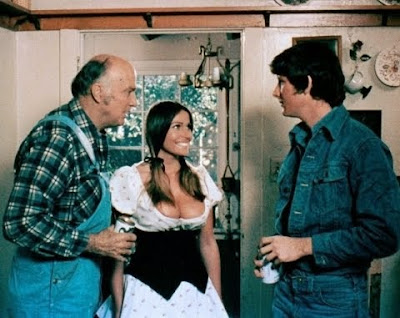Dillinger
A spoiler or two.
1973's DILLINGER plays fast and loose with the facts of the life of infamous bank robber John Dillinger. Much ink has been spilled over his quirks and pathological larceny. Even more blood was spilled during his eventful life. I haven't read the official biographies of him or the other key players in his story: FBI chief J. Edgar Hoover and Federal agent Melvin Purvis. Therefore, I don't know how many liberties writer and director John Milius took with his film.
I've read that it wasn't actually Dillinger who was gunned down outside the Biograph Theater in Chicago, but rather someone who went in his place. Even though Dillinger did build a fake gun that helped him break out of prison, I know he didn't really stop to rob a bank while speeding out of town (but it makes for a good scene).
And while a colorful life often doesn't require Hollywood embellishments, moments like that really flesh out this character. As played by Warren Oates, who even ressembles the guy, Dillinger is at heart just a giddy child with big dreams and pie in the sky optimism. Like many criminals, he truly believes he'll never get caught. "They won't ever get me. I may not live forever, but I'd be a damn fool not to try!"
Purvis (Ben Jonson) disagrees. He narrates much of DILLINGER, describing his tirelessness in bringing down the #1 perp, along with cronies Homer Van Meter (Harry Dean Stanton), Harry Pierpont (Geoffrey Lewis), Pretty Boy Floyd (Steve Kanaly), and a trigger happy Baby Face Nelson (Richard Dreyfuss). On the way to the inevitable climatic showdown, Purvis apprehends and/or kills a gallery of other criminals, learning from one of them the term "G-Man.", to his great amusement. Periodically, he even talks to Dillinger over the phone, kindly allowing the fugitive to reverse the charges. There's a fascinating scene as Purvis observes Dillinger and his moll (Michelle Phillips) dining at the same Chicago nightclub. As the agent is with his fiancee, he chooses not to nab him then and there, instead he sends over a magnum of champagne.
Touches like these, real or not, distinguish DILLINGER from other criminal bios. You can see the genesis for Michael Mann's later film about Dillinger et al., PUBLIC ENEMIES, and even MANHUNTER and HEAT, with their complex relationships between lawman and criminal. Also, how similiar each man may be. While Mann's Dillinger take is flashier and more polished, I think I prefer Milius' gritty and compact drama, an action film that doesn't settle for mere caricatures, or watered down characterizations lost in waves of large scale shootouts.
But like PUBLIC ENEMIES, there are many celebrated barrages of gunfire in this film. There is some seriously brutal and well staged gunplay. Milius really knows his way around action sequences, and you may be surprised at how much bloodletting there is for a film of its time. But the director also allows for some unexpected humor amongst the carnage. After Baby Face is gunned down, onlookers very cautiously approach his body, which appears lifeless until an arm rises up to fire more rounds. Meanwhile, as the dragnet tightens and the jig is clearly up, Van Meter audibly laments more than once that today is just not his day.
DILLINGER sports a fine cast. Everyone is solid, including Cloris Leachman who appears at the end as the pivotal Lady in Red. Kanaly (best known for his role on the original Dallas TV series) has a great scene just before he meets his maker. After the final gunfight, he takes refuge in an older couples' farmhouse. Just before he walks out to finally surrender, the wife asks him if he needs a Bible.
"I admit, I have sinned; I have been a sinner, but I enjoyed it. I have killed men, but the dirty sons-of-bitches deserved it. The way I figure it, it's too late for no Bible. Thanks just the same, Ma'am."
If Dillinger himself had had enough breath for his last words, I imagine he'd say something similar.



Comments